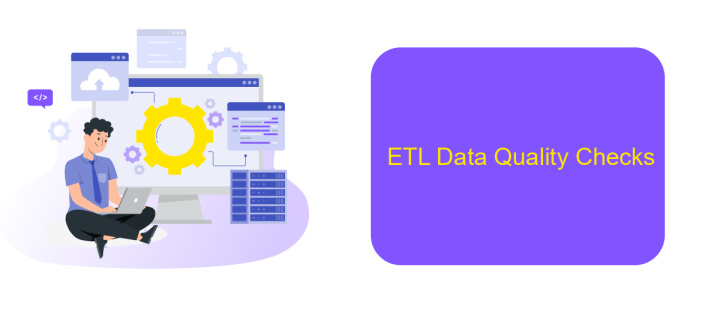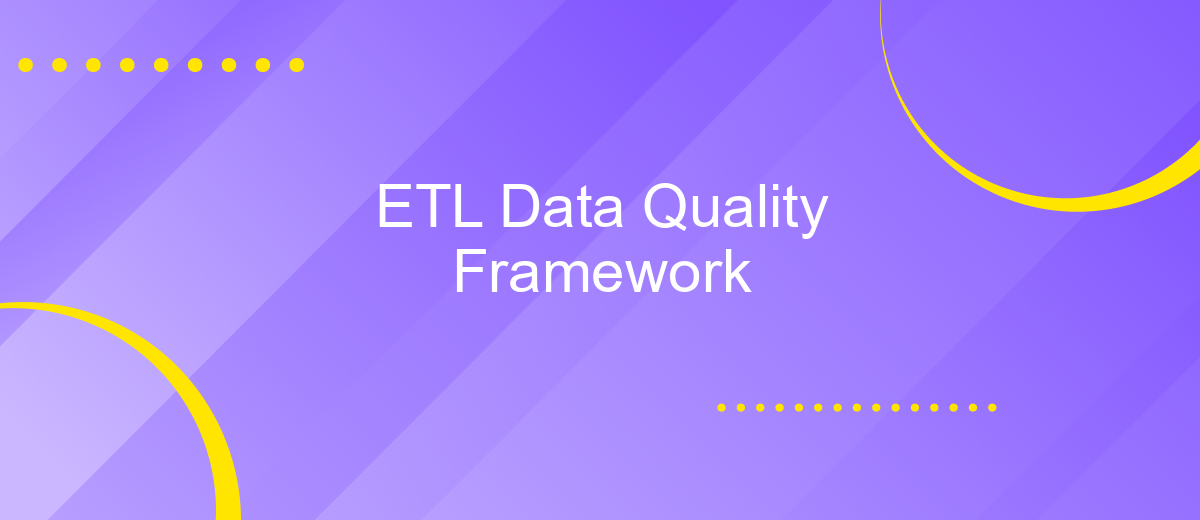ETL Data Quality Framework
Ensuring high data quality is crucial for effective decision-making in any organization. The ETL Data Quality Framework provides a structured approach to extract, transform, and load data while maintaining its integrity and accuracy. This framework helps identify and rectify data issues early in the process, ensuring reliable data for analytics and business intelligence applications.
ETL Data Quality Framework
Ensuring data quality in ETL processes is crucial for reliable analytics and decision-making. An ETL Data Quality Framework helps in maintaining the integrity, accuracy, and consistency of data as it moves from source to destination. This framework typically involves several key components and best practices.
- Data Profiling: Analyzing data to understand its structure, content, and quality.
- Data Cleansing: Identifying and correcting errors and inconsistencies in the data.
- Data Validation: Ensuring data meets predefined standards and business rules.
- Data Monitoring: Continuously tracking data quality metrics and performance.
- Integration Tools: Utilizing services like ApiX-Drive to simplify and automate data integration processes.
Implementing a robust ETL Data Quality Framework not only enhances the reliability of analytics but also reduces risks associated with poor data quality. Tools like ApiX-Drive can significantly streamline the integration process, ensuring that data flows seamlessly and accurately between systems. By adhering to these practices, organizations can achieve higher data quality and more informed decision-making.
Introduction

In today's data-driven world, the integrity and quality of data are paramount for making informed business decisions. ETL (Extract, Transform, Load) processes play a crucial role in managing data flow from various sources to a centralized data warehouse. However, ensuring the quality of data throughout these processes is a significant challenge that organizations face. A robust ETL Data Quality Framework is essential to maintain accuracy, consistency, and reliability of data, thus enabling businesses to trust and leverage their data effectively.
Implementing an ETL Data Quality Framework involves several key components such as data profiling, validation, cleansing, and monitoring. Tools and services like ApiX-Drive can greatly simplify the integration and automation of these processes. ApiX-Drive allows seamless connection between different data sources and applications, ensuring that data is accurately extracted, transformed, and loaded without manual intervention. By leveraging such services, organizations can enhance their ETL workflows, reduce errors, and maintain high data quality standards across their data pipelines.
Data Quality Dimensions

Data Quality Dimensions are critical for ensuring the reliability and accuracy of data within an ETL framework. These dimensions provide a structured approach to evaluating and enhancing data quality, which is essential for making informed business decisions.
1. Accuracy: Ensures that the data correctly reflects real-world entities and events.
2. Completeness: Measures whether all required data is present.
3. Consistency: Ensures that data is uniform across different datasets.
4. Timeliness: Ensures that data is up-to-date and available when needed.
5. Validity: Ensures that data conforms to predefined formats and standards.
6. Uniqueness: Ensures that each record is unique and free from duplicates.
Implementing a robust data quality framework often involves integrating various data sources and services. Tools like ApiX-Drive can simplify this process by automating data integration and ensuring that data quality dimensions are consistently maintained across all data pipelines. By leveraging such tools, organizations can achieve higher data quality standards, leading to more accurate analytics and better decision-making.
ETL Data Quality Checks

ETL Data Quality Checks are essential to ensure the accuracy, completeness, and reliability of data as it moves through the ETL pipeline. These checks help identify and rectify errors early in the process, minimizing the risk of data corruption and ensuring high-quality data for decision-making.
Implementing data quality checks involves validating data at various stages of the ETL process. This includes checking for data consistency, accuracy, completeness, and conformity to predefined standards. By integrating these checks, organizations can maintain the integrity of their data and trust the insights derived from it.
- Data Consistency: Ensuring data remains consistent across different sources and stages.
- Data Accuracy: Validating that the data is correct and free from errors.
- Data Completeness: Checking that all required data is present and accounted for.
- Data Conformity: Ensuring data adheres to specified formats and standards.
Tools like ApiX-Drive can facilitate the integration of ETL data quality checks by automating data validation processes. By leveraging such services, organizations can streamline their ETL workflows and enhance the overall quality of their data. Implementing robust data quality checks is a critical step in building a reliable and efficient ETL pipeline.


Best Practices for ETL Data Quality
Ensuring data quality in ETL processes involves several best practices. First, establish clear data quality metrics and continuously monitor them. Implement automated validation checks to detect anomalies early. Use data profiling tools to understand your data's structure and content, identifying potential issues before they affect downstream processes. Regularly update and maintain your ETL scripts to adapt to changing data sources and requirements.
Another critical practice is to implement robust error handling and logging mechanisms. This ensures that any data quality issues are promptly identified and addressed. Utilize integration services like ApiX-Drive to streamline data flows and enhance data consistency across various platforms. Additionally, ensure proper documentation of your ETL processes to facilitate easier troubleshooting and maintenance. Regular audits and reviews of ETL processes can further help in maintaining high data quality standards.
FAQ
What is an ETL Data Quality Framework?
Why is data quality important in ETL processes?
How can I automate data quality checks in my ETL process?
What are some common data quality issues encountered in ETL processes?
How can I measure the effectiveness of my ETL Data Quality Framework?
Time is the most valuable resource for business today. Almost half of it is wasted on routine tasks. Your employees are constantly forced to perform monotonous tasks that are difficult to classify as important and specialized. You can leave everything as it is by hiring additional employees, or you can automate most of the business processes using the ApiX-Drive online connector to get rid of unnecessary time and money expenses once and for all. The choice is yours!

